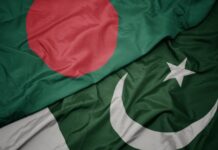In the Pakistani city of Gwadar, where a significant Chinese-constructed deep seaport is located, a tense confrontation is unfolding between the military and Baloch demonstrators protesting against reported human rights abuses.
Over the weekend, thousands of individuals, guided by the Baloch Unity Committee (BYC), a movement advocating for ethno-nationalistic rights, gathered in the southwest city for a Baloch National Gathering. Their demands include the return of those who have disappeared under suspicious circumstances and a more substantial role in Chinese-backed initiatives within the resource-rich yet economically disadvantaged Balochistan province.
In a statement Monday, the Pakistani military said one of its personnel was killed when a “violent mob in the garb of Baloch Raji Muchi [Baloch National Gathering] attacked security forces’ personnel.” Pakistani military controls security in Gwadar.
The statement also said 16 other personnel were injured in “unprovoked assaults by violent protesters” and vowed, “those responsible will be brought to justice.”
In a video statement to media, BYC leader Mahrang Baloch said authorities have arrested nearly 1,000 protesters in the last three days in an effort to derail the protest movement.
On Sunday, Baloch and other activists addressed the crowd of protesters in Gwadar that had gathered despite attempts by authorities to block them. The event received virtually no coverage in mainstream media.
BYC later announced the protest would transform into a sit-in, vowing to remain until those prevented from coming to Gwadar to join the protest were given access and all the detained protesters were released.
“Those who are trying to march, they are not letting them go. They are not letting them enter Gwadar,” Sadia Baloch, a unity committee member not related to Mahrang Baloch, told media on Monday from the provincial capital Quetta.
Inaugurated in 2016, the seaport in Gwadar is the flagship project of the multibillion-dollar China-Pakistan Economic Corridor. Known by its acronym CPEC, the project is central to Beijing’s global Belt and Road Initiative.
“Gwadar is being called a game-changer for Pakistan and China, so it was important to tell them and the international media that this land belongs to us,” Sadia Baloch said. “The crackdown shows Baloch are not allowed to enter Gwadar.”
According to BYC, at least one person has died and several were injured as authorities continue to crack down on protesters in Gwadar. At least 14 people were injured in the town of Mastung on Saturday as they attempted to move towards Gwadar.
In many cities and towns, protesters blocked from moving forward also staged sit-ins.
Speaking Monday on the floor of the Provincial Assembly of Balochistan, Chief Minister Sarfraz Bugti accused the demonstrators of engaging in anti-state propaganda and spoiling efforts to bring more Chinese investment.
Bugti and BYC activists have said they are ready to negotiate.
Authorities have suspended internet and cellular services in and around Gwadar since at least Friday, making it difficult for media to ascertain facts independently and to speak to local officials. Amnesty International urged Pakistani authorities Sunday to end the communication blackout.
Authorities have enforced a suspension of internet and cellular services in and near Gwadar since at least Friday, impeding media verification of information and communication with local officials. Amnesty International urged Pakistani authorities on Sunday to end the communication blackout.
Last year, BYC organized a 1,600-kilometer march to Islamabad with families hoping for the safe return of their missing loved ones caught in the conflict between the state and Baloch separatists. Protesters encountered harsh police measures upon their attempt to enter the capital. Despite enduring cold weather for days, demonstrators departed when authorities alerted them to a potential security risk.
As Pakistan deals with a resurgent wave of terrorism lead by Islamist militants and Baloch separatists, the state is struggling to ensure Chinese personnel and projects remain safe.
On Monday, Pakistan’s Interior Minister Mohsin Naqvi apprised Zhao Shiren, China’s Consul General in Lahore, of security measures Islamabad is taking to protect Chinese nationals in the country.
Source: VOA
